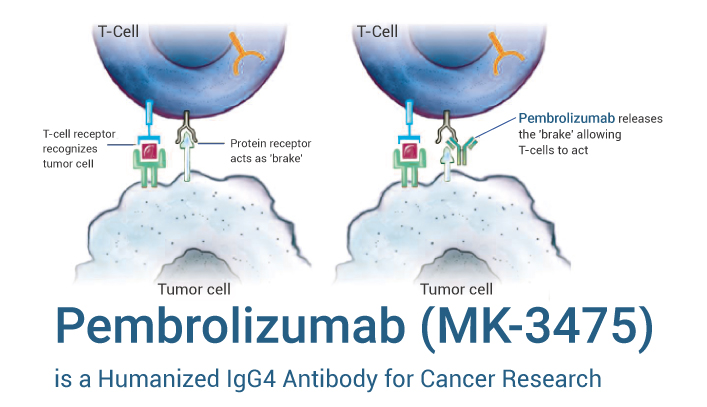Programmed death 1 (PD-1), also known as CD279, belongs to the CD28 superfamily. Firstly, PD-1 is an inhibitory receptor that is expressed on T cells, NK cells, B cells, monocytes, and dendritic cells. Secondly, PD-1 interacts with the ligands PD-L1 (B7-H1) and PD-L2 (B7-DC), which serves as a “rheostat” of immunological regulation, suppressing the activation and function of T cells to downregulate the immune response. Moreover, PD-1 and its ligands play a fundamental role in the evasion of tumor cells from antitumor immunity. Moreover, PD-1 and PD-L1 are recognized as powerful targets to enhance tumor-directed cytotoxic T-cell function. In addition, the PD-1/PD-L1 axis also regulates antiviral immune responses. PD-1 inhibitors are a new class of drugs that block PD-1, which activates the immune system to attack tumors and play a role in treating certain types of cancer.
Pembrolizumab (MK-3475) is a humanized anti-PD-1 IgG4 antibody for cancer research.
Pembrolizumab (MK-3475) is a humanized IgG4 antibody inhibiting the programmed cell death 1 (PD-1) receptor, used in cancer immunotherapy. In some in vitro studies, Pembrolizumab can increase the secretion of cytokines IFN-γ, TNF-α, and the apoptotic cell death of A549 cells. In addition, it improves the αROR1-CAR T-mediated cytotoxicity and reduces tumorigenesis in the co-cultured αROR1-CAR T and A549 cells by blocking PD-1::PD-L1 interaction in αROR1-CAR T cells. Besides, it can enhance αROR1 CAR T killing of A549 lung cancer cells under elevated pressure. In in vivo studies, Pembrolizumab (5 mg/kg; intravenous injection; once) inhibits tumor size in A549 xenograft mice pretreated by pressure. Also, it reduced tumorigenesis in αROR1-CAR T cells and co-cultured with A549 cells.
In summary, Pembrolizumab (MK-3475) is a humanized IgG4 antibody, an inhibitor of PD-1, for the study of cancer immunity.
References:
[1] Zhenglin Ou, et al. Sci Rep. 2022 Apr 28;12(1):6919.
[2] Jacob Schachter et al. Lancet. 2017 Oct 21;390(10105):1853-1862.
